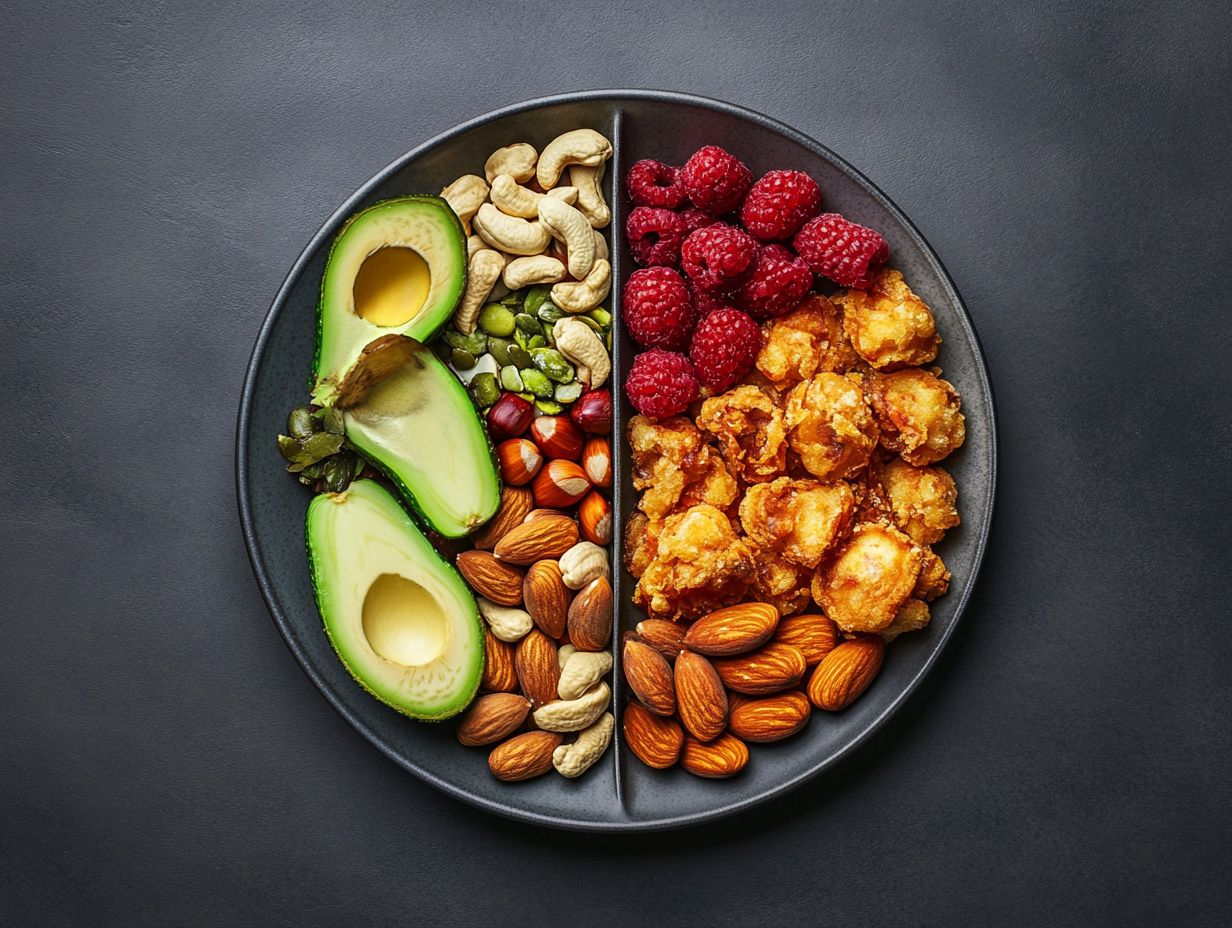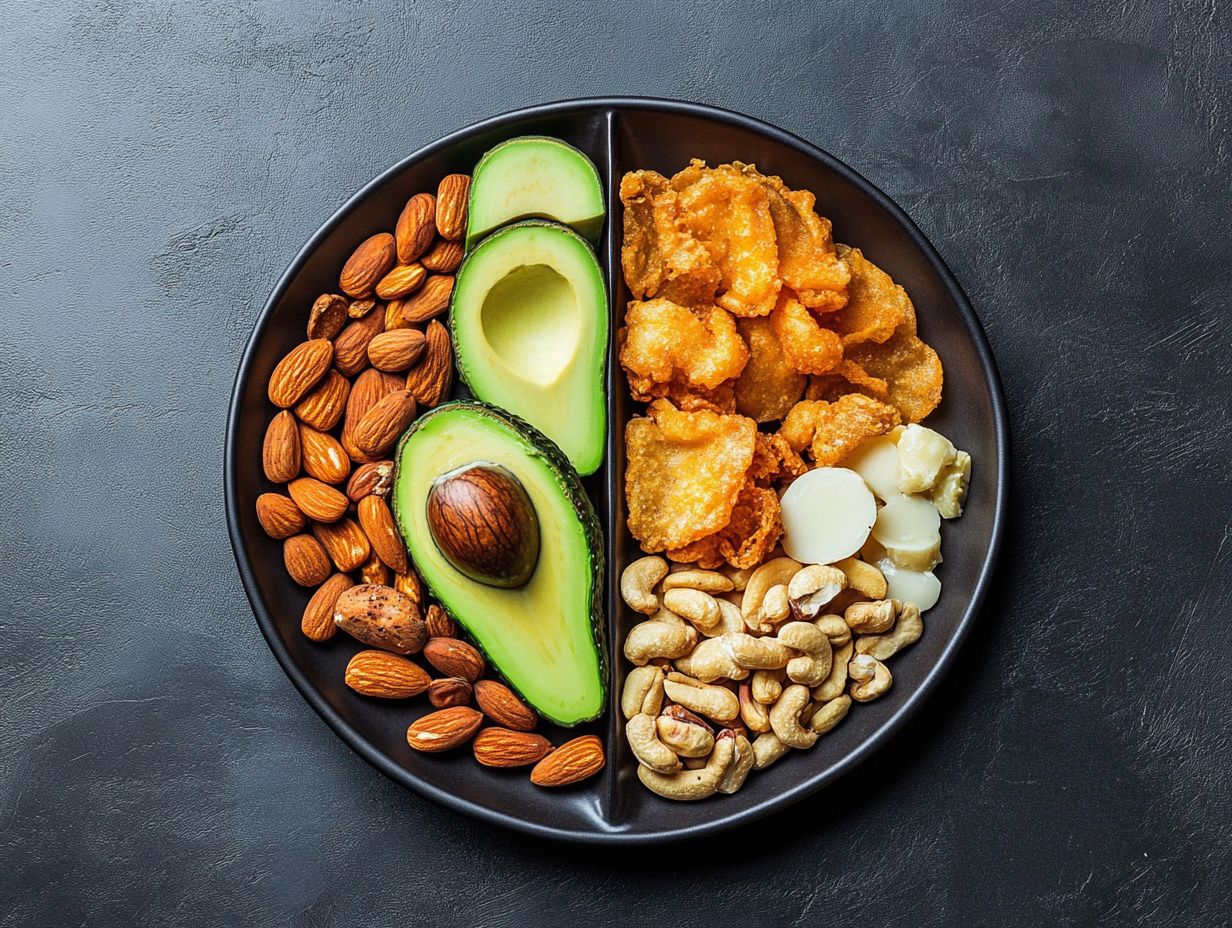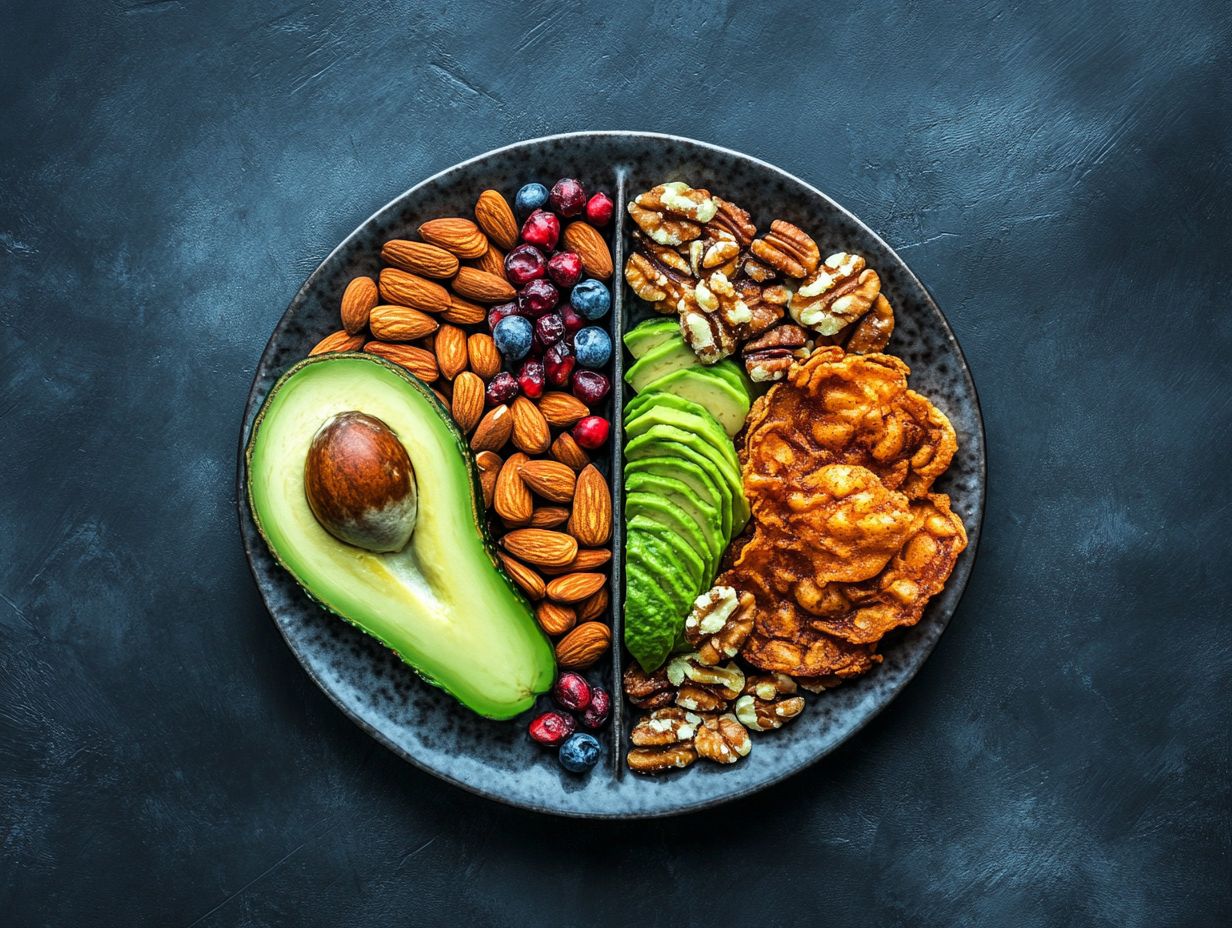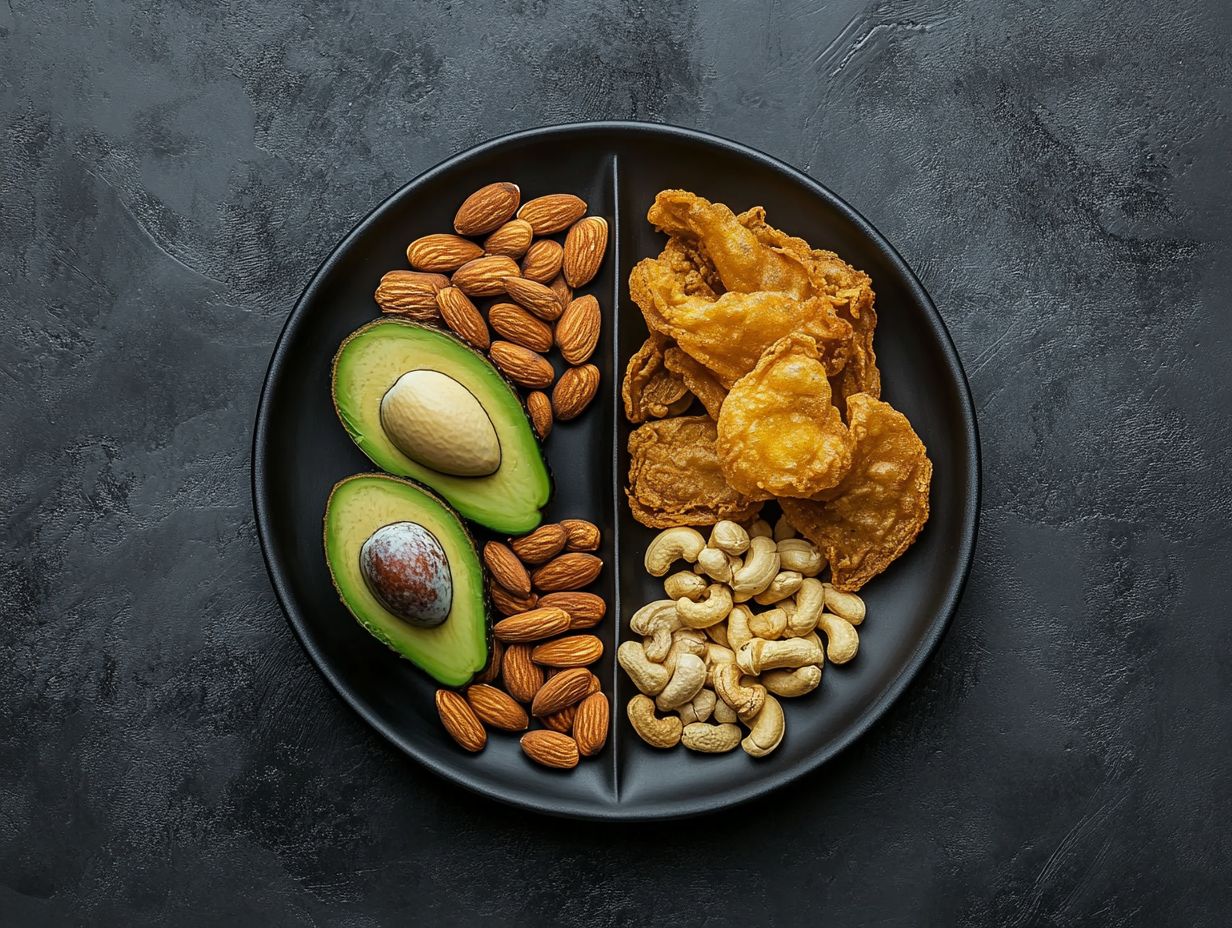Healthy Fats: The Good, the Bad, and the Ugly
Fats often receive a negative reputation in conversations about healthy eating, but they are essential to your overall well-being.
By understanding the various types of fats good, bad, and ugly you can revolutionize your approach to nutrition.
This article delves into the vital functions of fats within your body, showcases the benefits of healthy fats, and reveals the risks associated with unhealthy ones.
Find out how to easily add healthy fats to your meals to achieve optimal health. Immerse yourself in this knowledge to make smarter choices for a balanced lifestyle!
Contents
Key Takeaways:

- Healthy fats are essential for a balanced and nutritious diet as they play a crucial role in the body’s functions.
- Including healthy fats, such as monounsaturated and polyunsaturated fats, can provide various benefits like improved heart health and better brain function.
- Unhealthy fats, such as trans fats, can increase the risk of heart disease and other health issues, so it’s important to limit their consumption.
The Importance of Fats in a Healthy Diet
Understanding the importance of fats in your diet is essential for maintaining overall health and well-being. Fats serve not only as a source of energy but also play critical roles in supporting brain function, absorbing fat-soluble vitamins, and regulating cholesterol levels.
It’s vital for you to differentiate between good fats and bad fats. The right types can actually reduce your risk of chronic diseases like heart disease and inflammation. Unhealthy fats can lead to serious health complications. Therefore, a balanced intake of dietary fats is foundational for a nutritious diet, profoundly impacting both your physical and mental health.
Role of Fats in the Body
Fats are important for your body, serving as a primary energy source and supporting essential physiological functions.
These vital nutrients do more than just provide energy; they are crucial for maintaining the structure of your cell membranes, allowing your cells to function efficiently. Fats also help your body absorb fat-soluble vitamins like A, D, E, and K, ensuring you can effectively utilize these important nutrients.
It’s important to pay attention to the balance between high-density lipoprotein (HDL) and low-density lipoprotein (LDL) cholesterol. By making healthier dietary choices, you can boost HDL while keeping LDL levels in check, ultimately leading to better heart health. Such dietary considerations are essential for promoting your overall well-being.
The Good Fats
Good fats, often known as healthy fats, encompass unsaturated fats like monounsaturated and polyunsaturated varieties, which are vital for your heart and overall well-being. These fats play a crucial role in numerous bodily functions, such as reducing inflammation, supporting brain health, and regulating cholesterol levels.
You’ll find an abundance of sources for these healthy fats in nature, including fatty fish packed with omega-3 fatty acids, as well as nuts, seeds, and plant oils. Start experiencing incredible health benefits today!
Types of Healthy Fats
Healthy fats can be divided into two primary categories: monounsaturated fats and polyunsaturated fats, each offering distinct health benefits.
Monounsaturated fats, which you ll find in abundance in foods like avocados and olives, are celebrated for their heart-health benefits. They work to lower bad cholesterol levels, promoting the vitality of your heart by supporting healthy blood circulation and regulating inflammation.
On the flip side, polyunsaturated fats encompassing omega-3 and omega-6 fatty acids are typically sourced from fatty fish like salmon and nutrient-rich walnuts. These fats are essential for optimal brain function and possess anti-inflammatory properties that help combat chronic diseases.
Integrating these healthy fats into your diet can profoundly enhance your overall wellness.
Benefits of Including Healthy Fats in Your Diet

Including healthy fats in your diet brings a wealth of benefits, from elevating your heart health to enhancing brain function and stabilizing your mood.
These beneficial fats, found in delightful foods like avocados, nuts, seeds, and oily fish, play an important part in regulating cholesterol levels, greatly reducing your risk of cardiovascular diseases.
They re essential for mental function too, as your brain is primarily composed of fat and thrives on sources like omega-3 fatty acids.
Research indicates that these healthy fats can reduce inflammation throughout the body, contributing to your overall wellness.
Adding these nutritious fats can boost your mood and help you feel better by balancing the hormones and neurotransmitters that influence mental health.
These fats also help with weight management by promoting satiety and enhancing metabolic performance.
Truly, healthy fats are a vital component of a balanced and nutritious diet, and embracing them can elevate your health to new heights.
The Bad Fats
You may not realize it, but bad fats, such as saturated and trans fats, can profoundly affect your health.
These unhealthy fats significantly raise the risk of developing chronic diseases, making it crucial to be mindful of your dietary choices.
Types of Unhealthy Fats
Unhealthy fats largely comprise saturated and trans fats, which often hide in processed foods and certain animal products.
These fats can have a significant impact on your health, frequently found in items like fried foods, baked goods, and even margarine.
Saturated fats, typically found in fatty cuts of meat and full-fat dairy products, have been linked to elevated cholesterol levels, which can escalate the risk of cardiovascular issues over time.
Trans fats, meanwhile, are often present in hydrogenated oils and many snack foods, contributing to inflammation and increasing the risk of heart disease.
It s essential for you to scrutinize nutrition labels carefully, as many products that appear healthy at first glance may still harbor these harmful fats.
By making informed choices, you can significantly reduce the potential health risks associated with these fats.
Health Risks Associated with Unhealthy Fats
The consumption of unhealthy fats presents considerable health risks, particularly in relation to heart disease and unfavorable cholesterol levels.
These fats, often found in processed foods and fried items, can trigger chronic inflammation, increasingly recognized as a fundamental contributor to various health issues.
When you unknowingly incorporate high amounts of trans and saturated fats into your diet, you may find yourself elevating your low-density lipoprotein (LDL) cholesterol levels commonly known as ‘bad cholesterol,’ which can lead to the troubling buildup of plaque in your arteries.
This buildup heightens the risk of cardiovascular diseases.
By making informed dietary choices and selecting healthier fats, like those from avocados, nuts, and olive oil, you can significantly mitigate these risks and foster better overall health.
Take charge of your health today by choosing better fats!
The Ugly Fats
Trans fats, often labeled as the ‘ugly fats’, are artificial fats produced through hydrogenation.
Their reputation is well-deserved, as they are notorious for their detrimental effects on health.
Trans Fats and Their Negative Impact on Health

Trans fats are implicated in a range of health issues. They elevate bad cholesterol levels while diminishing good cholesterol. This imbalance can lead to atherosclerosis (narrowing of the arteries), significantly heightening your risk of heart disease.
When you consume trans fats, you also foster inflammation in your body. This contributes to various chronic diseases, including heart conditions and diabetes. These unhealthy fats also disrupt insulin sensitivity (the body s response to insulin), compounding their detrimental effects on cardiovascular health.
To protect yourself from the dangers of trans fats, check food labels carefully and choose healthier alternatives. Opt for unsaturated fats found in olive oil, nuts, and avocados. This can help you cultivate a more heart-friendly diet.
Incorporating Healthy Fats into Your Diet
Incorporating healthy fats into your diet is crucial for achieving balanced nutrition and enhancing your overall health. With a few mindful dietary choices, you can seamlessly integrate these beneficial fats into your meals.
Tips for Choosing and Cooking with Healthy Fats
Choosing and cooking with healthy fats can elevate the nutritional profile of your meals and promote better health outcomes.
Select fats that offer beneficial nutrients without sacrificing flavor. Start by opting for plant-based oils like olive or avocado oil instead of traditional animal fats. These oils are packed with heart-healthy monounsaturated fats.
Incorporate a variety of nuts and seeds such as walnuts or flaxseeds into your salads, smoothies, and snacks. This enhances both texture and nutrition.
When using these healthier fats in your cooking, consider methods like saut ing at lower temperatures or drizzling oils over your finished dishes. This way, you preserve their nutritional integrity while elevating the overall taste.
The Importance of Balancing Your Fat Intake for Optimal Health
Balancing your fat intake is essential for optimal health. This allows you to harness the benefits of healthy fats while minimizing the risks associated with unhealthy counterparts.
This balance supports your heart health and plays a significant role in maintaining healthy brain function and regulating hormones. Focus on incorporating sources of monounsaturated and polyunsaturated fats think avocados, nuts, and olive oil while limiting saturated and trans fats found in processed foods.
Consider your specific dietary needs based on your personal health goals, whether that s weight management or reducing inflammation. These factors can significantly influence your dietary choices and overall well-being. By mindfully selecting your fat sources, you can cultivate lasting health benefits and enrich your quality of life.
Frequently Asked Questions
What are healthy fats?

Healthy fats are unsaturated fats that are beneficial for our health. They can be found in foods like avocados, nuts, and olive oil.
What are the benefits of healthy fats?
Healthy fats provide our bodies with energy, support cell growth, protect our organs, and help in the absorption of certain vitamins. They promote heart health and can help lower cholesterol levels.
What are some examples of good sources of healthy fats?
Some examples of good sources of healthy fats include avocados, salmon, olive oil, nuts, seeds, and nut butters.
What are unhealthy fats?
Unhealthy fats are saturated and trans fats, which are found in processed foods, fried foods, and high-fat dairy products. These fats can increase your risk of health issues such as heart disease and high cholesterol.
Why are unhealthy fats considered bad for our health?
Unhealthy fats can raise our levels of LDL (bad) cholesterol, leading to plaque buildup in our arteries and increasing the risk of heart disease. They are also high in calories and can contribute to weight gain when consumed in excess.
Embrace these healthy fats to boost your well-being! Start incorporating them into your diet today for a healthier lifestyle.
Can We Completely Eliminate Fats from Our Diet?
No, eliminating fats from our diet is not a good idea. Our bodies need good fats to function well and absorb certain vitamins.
The key is to choose the right fats and enjoy them in moderation. Avoid fats that are bad for your health!






